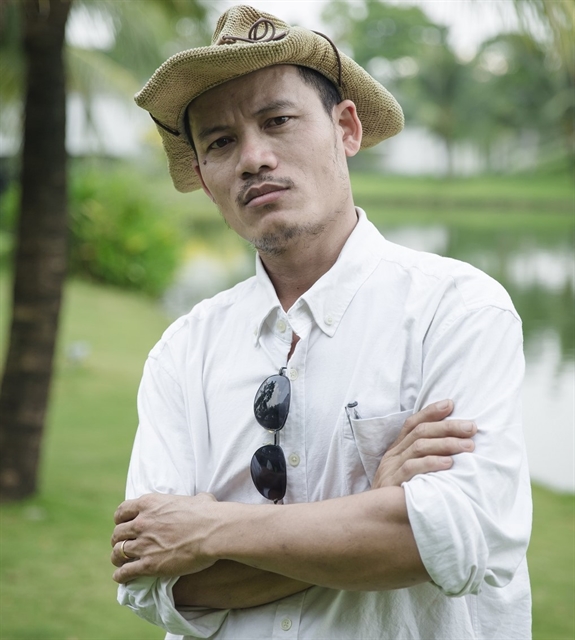
Sculptor Trần Thiện Nhứt. Photo courtesy of luxuo.vn
Artworks by sculptor Trần Thiện Nhứt were auctioned at Drouot Auction House in Paris, France, last month. Nhứt graduated from the HCM University of Fine Arts and has made his name creating pieces using natural materials, or materials that he recycled. He spoke about his choosing challenging materials in his art.
Could you tell about recyclable materials that you use to create works?
I began to work with recyclable materials four years ago. Before that, I created with stone and resin, but their toxic effects made me stop. I started researching alternative materials to unleash my creativity both meeting longevity and aesthetic requirements, so the idea of using recycled cardboard took root in my sculpting career.
I look for recyclable paper from different sources then ground, beat it and I use clean glue on the frame. There are items such as tables and chairs. At first, most people who don't know them are fooled by their eyes because they think they are stone tables and chairs. But they are made from cardboard.
There are only a few small details like table and chair legs that require additional iron to be threaded inside, for the rest I use paper boards. After processing the rough parts by hand, I apply lacquer paint to the products because of its unique aesthetics.
Do you know why your products are well received in foreign markets such as US and Europe?
In fact, most people within the Vietnamese fine arts circle know about my techniques of sculpture and they highly appreciate it. But common customers still hesitate about and have not accepted creative products.
It is difficult to get Vietnamese people to buy a chair with US$2,000. Meanwhile, in the US or Europe, I can sell a product in the same price range more easily.
Our furniture is a combination of sculpture and application to become a household consumer product. Our value does not stop at a simple table or chair, but it is an artwork. Therefore, it is difficult for us to reduce prices to please domestic consumers.
Cardboard sculpture is quite rare and unique in Việt Nam. Are you afraid that people will create their own products with cardboard material?
It's true that the formula isn't too special. And my goal is not to keep the formula for myself, I want the idea to spread so the more people know the better. I plan to share the first session about it at HCM University of Fine Arts and if anyone comes to me to learn, I am ready.
Some people ask me why I don't register my copyright. But I think that if I register copyright, will I and my team be able to fully exploit its application? Just let it happen naturally. When the formula is spread, the sustainability will benefit society and the earth as well.
Some artists create interior products like yours, but they do not last long. In your opinion, what is the reason for this?
The barrier, in my opinion, is not the material or the complicated production process but the output. We also have difficulty convincing domestic customers. I once risked my life to invest in exporting a container of hundreds of products to Europe for auction. Luckily, the westerners acknowledge the environment protection and they accept my products because of their sustainability and aesthetics.
Up to now, we have exported seven containers and our products are currently displaying in galleries such as Maison Gerard Paris and Valerie Goodman in the US.
So, Vietnamese artists need to have the financial resources and time too, to follow this way, it cannot be rushed.
Where does your creative inspiration usually come from?
My creative world comes from the breath of nature such as a chair in the shape of a leaf or a table decorated with images of wild animals. For another chair, I am inspired by ocean waves to make graceful curves and colours.
You are successful with cardboard material. What other materials are you researching?
I want to try and find sustainable alternative materials in my path. Recently, my partners in the US and Europe asked me to try to make a jar which could dissolve in water within 10 to 15 minutes without harming the environment.
I researched and made a jar from sand and edible glue. It dissolves in water within seven minutes and surprises my partners. They hope that I can produce them on a large scale.
Step by step my creations are associated with research on materials to replace plastic and nylon, creating products that are highly applicable, environmentally friendly and artistic.
Humans are facing up to environmental pollution, the greenhouse effect and rising sea levels. If we could use artistic creativity to limit all those things, what would be better than that? VNS
OVietnam